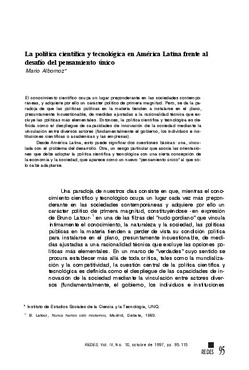La política científica y tecnológica en América Latina frente al desafío del pensamiento único
Science and Technology Policy in Latin America faced with the "unique thought" challenge
Fecha
1997-10Autor
Albornoz, MarioResumen
El conocimiento científico ocupa un lugar preponderante en las sociedades contemporáneas, y adquiere por ello un carácter político de primera magnitud. Pero, se da la paradoja de que las políticas públicas en la materia tienden a instalarse en el plano, presuntamente Incuestionable, de medidas ajustadas a la racionalidad técnica que excluye las políticas más elementales. Entonces, la política científica y tecnológica es definida como el despliegue de capacidades de innovación de la sociedad mediante la vinculación entre diversos actores (fundamentalmente el gobierno, los individuos e instituciones científicas o académicas y las empresas).
Desde América Latina, esto puede significar dos cuestiones básicas: una, vinculada con el problema del desarrollo. Otra, un sesgo particular que asocia las orientaciones que debe adoptar la política científica y tecnológica con una cierta concepción de la economía y la sociedad, que aparece como un nuevo "pensamiento único" al que sólo cabe adaptarse. Scientific knowledge plays, as it is well known, a crucial role in contemporary societies, and therefore it has a growing public and politic significance. Paradoxically, however, public S&T policies tend to justify themselves by the fact that they are displayed exclusively according a technical rationale that excludes any political issue. Science and technology policies are defined, then, as the development of social innovation capabilities, through links established among social actors (specially government, citizens and scientific institutions and the firms).
When observed from Latin America, this could result in two basic implication: the first one is linked to development process; the second one is a particular bias associating the orientations that science and technology policy must adopt, to a particular idea about economy and society which appears as a new "unique thought", where no alternative is possible, except to adapt ourselves to it.

